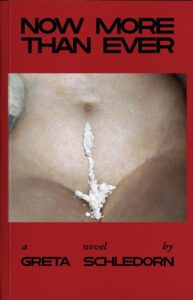
[Dream Boy Book Club; 2025]
Greta Schledorn’s Now More Than Ever, the Brooklyn-based author’s first full-length work, begins in doubt about what writing can still do and lets that uncertainty set it in motion Its fragments accumulate like sediment. Observations, apologies, stray sentences insist on the dignity of their own smallness. The result is less a narrative than a prolonged act of endurance. If confession was once the route to truth, Schledorn shows what happens when that route collapses under the weight of performance.
“It’s not cringe to publish my diary,” she writes early on. The line is both defense and provocation. It situates the book inside a culture where exposure is the default mode, where the diaristic has become indistinguishable from the performative. What Schledorn reveals isn’t a secret self but the impossibility of having one. By turns sardonic and unguarded, she moves through the digital detritus of daily life: coffee orders, reminders, late-night scrolls. The repetition doesn’t flatten experience; it insists on survival.
These fragments are deliberately anti-epiphanic. “I’m not writing about what happened,” she says, “I’m writing about how it feels.” That distinction between event and affect defines the book’s politics. Rather than documenting trauma for recognition or redemption, Now More Than Ever lingers in the untransformed middle of things. It refuses the closure that would make its speaker legible or safe. Each entry circles the same questions—how to live without pretending to be healed, how to stay when everything pushes you toward display—and leaves them open, unsatisfied.
Now More Than Ever is a study in sincerity’s exhaustion. “Everyone wants to sound edgy and detached and cool…the edgiest thing you can do is be fucking for real.” This line, tossed off like a text to a friend, doubles as a manifesto for the book’s quiet radicalism. To be “for real” in a world built on irony and performance is not naïve; it’s dangerous. Now More Than Ever performs that danger through its tone, a mix of deadpan humor, vulnerability, and a kind of weary moral clarity that feels both generational and idiosyncratic.
The fragments themselves are brief, sometimes only a few lines, and they accumulate into a rhythm that mirrors the conditions they describe: attention fractured, selfhood dispersed. “I only write because it’s a way to feel some sort of connection,” Schledorn admits. “It’s still a performance at the end of the day.” Writing becomes both symptom and cure. She knows the performance can’t save her, but also that silence would erase her. The double bind is the book’s heartbeat.
Dream Boy Book Club, a small press known for publishing experimental, internet-native voices, designs its books like artifacts of the present moment. Its minimalist design amplifies the tension between intimacy and distance. The page feels like a chat window gone still, the white space doing as much work as the text. This restraint links Schledorn to writers like Anne Boyer, Kate Zambreno, and Moyra Davey, though her voice is distinctly her own: drier, funnier, more millennial in its awareness that even rebellion has been optimized. She pushes that awareness toward something bleaker and more lucid—a recognition that meaning itself has been thinned by repetition, that both love and violence risk feeling simulated.
Maybe we’ve evolved past the need for words. Maybe none of this means anything. No one needs to read it. No one needs to hear it. We’ve all read enough. Everything’s starting to feel very made up. Love is made up and violence is made up.
The prose doesn’t lament this collapse; it studies it, tracing how detachment becomes the only available form of care.
Within that exhaustion lies a politics. Now More Than Ever rejects the confessional’s promise that language can redeem suffering and turns this failure into a form of truth. The repetition of wanting, failing, wanting again becomes an ethic of persistence. What Schledorn performs isn’t authenticity but endurance.
Schledorn’s realism is material, bodily. The book’s attention to the smallest acts—scrolling, eating, texting, breathing—recalls a feminist lineage of writers who located the political in the domestic. But where earlier generations found transcendence in naming the everyday, Schledorn finds depletion. Her writing insists that depletion is worth naming, too. The tone is wry but tender, the kind of humor that arrives only after the energy to argue is gone. “He said I’m too cynical about everything,” she admits. “I said it’s just that I care and I want for things to be different and I don’t think it’s cute or funny or interesting to pretend like nothing we do matters.
Irony, for her, isn’t a pose; it’s the last available register of sincerity.
The book’s closing section gestures toward peace but never quite touches it. “I bought a cherry limeade just to hold it.” It’s one of the simplest sentences in the collection and also the most devastating. The act of holding—an object, a thought, the day—becomes emblematic of Schledorn’s aesthetic: no resolution, only contact.
If the middle of Now More Than Ever makes exhaustion political, its ending extends that logic to doubt. “It’s not hard to face the terrible ugly things in the world,” Schledorn reflects, “it’s hard to face the good things on the other side of all that.” That doubleness, of sincerity and performance, pain and pleasure, holds the book together long after its speaker begins to dissolve. When she admits she’s “never drank a cherry limeade” and wonders “who could possibly know” if what she’s written is real or generated by a machine, the line lands like a thesis: the twenty-first-century self no longer distinguishes between living and writing, feeling and scripting.
The book ends in movement—restaurants, bars, late-night parties— with a specificity that refuses transcendence even as it edges toward abstraction. It asks not what happens, but what can still count as happening when every emotion risks replication. Schledorn doesn’t close the distance between the body and its performance; she leaves it open, flickering. Her final scenes don’t redeem anything. They keep the performance going, and in that persistence lies the book’s quiet courage.
Now More Than Ever doesn’t promise transcendence; it leaves us inside the simulation, watching the edges blur. Its truth is conditional, provisional, maybe even artificial—but that’s what makes it feel, uncannily, like the real thing.
Holly Coleman lives in Jacksonville, Florida. Her work has appeared in Anthropocene Poetry Journal, On The Rag, Tough Poets Review, and other places. She teaches writing at the University of North Florida and is a Ph.D. student at Old Dominion University, where she studies British Romanticism and the rhetoric of art and activism.
This post may contain affiliate links.






